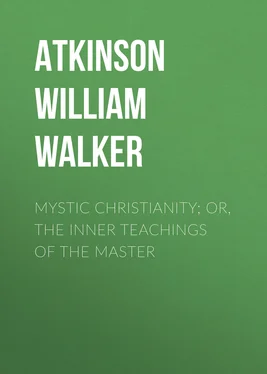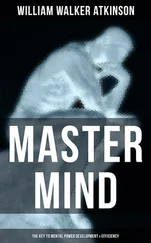William Atkinson - Mystic Christianity; Or, The Inner Teachings of the Master
Здесь есть возможность читать онлайн «William Atkinson - Mystic Christianity; Or, The Inner Teachings of the Master» — ознакомительный отрывок электронной книги совершенно бесплатно, а после прочтения отрывка купить полную версию. В некоторых случаях можно слушать аудио, скачать через торрент в формате fb2 и присутствует краткое содержание. Жанр: foreign_prose, foreign_religion, Философия, foreign_psychology, foreign_antique, на английском языке. Описание произведения, (предисловие) а так же отзывы посетителей доступны на портале библиотеки ЛибКат.
- Название:Mystic Christianity; Or, The Inner Teachings of the Master
- Автор:
- Жанр:
- Год:неизвестен
- ISBN:нет данных
- Рейтинг книги:5 / 5. Голосов: 1
-
Избранное:Добавить в избранное
- Отзывы:
-
Ваша оценка:
- 100
- 1
- 2
- 3
- 4
- 5
Mystic Christianity; Or, The Inner Teachings of the Master: краткое содержание, описание и аннотация
Предлагаем к чтению аннотацию, описание, краткое содержание или предисловие (зависит от того, что написал сам автор книги «Mystic Christianity; Or, The Inner Teachings of the Master»). Если вы не нашли необходимую информацию о книге — напишите в комментариях, мы постараемся отыскать её.
Mystic Christianity; Or, The Inner Teachings of the Master — читать онлайн ознакомительный отрывок
Ниже представлен текст книги, разбитый по страницам. Система сохранения места последней прочитанной страницы, позволяет с удобством читать онлайн бесплатно книгу «Mystic Christianity; Or, The Inner Teachings of the Master», без необходимости каждый раз заново искать на чём Вы остановились. Поставьте закладку, и сможете в любой момент перейти на страницу, на которой закончили чтение.
Интервал:
Закладка:
And so, the doctrine is plainly stated and firmly insisted upon by the orthodox churches of today, although such was not always the case for the matter was one which gave rise to much conflict and difference of opinion in the early centuries of the Church, the present view, however, overcoming those who opposed it, and finally becoming accepted as beyond doubt or question by the orthodox, believing Christian.
But the present time finds many leading minds in the churches, who refuse to accept the doctrine as usually taught, and the voice of the Higher Criticism is heard in the land in increasing volume and many doctrines unquestioningly held by the pews are being abandoned by the pulpits, usually in the way of "discreet silence" being maintained. But here and there courageous voices are heard stating plainly that which their reason and conscience impels. We shall now consider these dissenting opinions.
We have to say here, at this point, that we have no sympathy for the so-called "infidel" opinion, which holds that the whole tale of the Virgin Birth was invented to conceal the illegitimate birth of Jesus. Such a view is based neither on intelligent investigation or criticism, or upon the occult teachings. It was merely "invented" itself, by those who were unable to accept current theology and who, when driven from the churches, built up a crude system of reconstructed Biblical History of their own. And so we shall not stop to even consider this view of the matter, but shall pass on to the scholarly objectors and their views and thence to the Occult Teachings.
In the first place, the theologians who favor the views of the Higher Criticism object to the idea of the Virgin Birth upon several general grounds, among which the following are the principal ones:
(1) That the story of the Divine Conception, that is the conception by a woman of a child without a human father, and by means of a miraculous act on the part of Deity, is one found among the traditions, legends and beliefs of many heathen and pagan nations. Nearly all of the old Oriental religions, antedating Christianity by many centuries, contain stories of this kind concerning their gods, prophets and great leaders. The critics hold that the story of the Virgin Birth and Divine Conception were borrowed outright from these pagan legends and incorporated into the Christian Writings after the death of Christ;
(2) that the idea of the Virgin Birth was not an original Christian Doctrine, but was injected into the Teachings at a date about one hundred years, or nearly so, after the beginning of the Christian Era; this view being corroborated by the fact that the New Testament Writings themselves contain very little mention of the idea, the only mention of it being in two of the Gospels, those of St. Matthew and St. Luke—St. Mark and St. John containing no mention of the matter, which would not likely be the case had it been an accepted belief in the early days of Christianity—and no mention being made of it in the Epistles, even Paul being utterly silent on the question. They claim that the Virgin Birth was unknown to the primitive Christians and was not heard of until its "borrowing" from pagan beliefs many years after. In support of their idea, as above stated, they call attention to the fact that the New Testament writings, known to Biblical students as the oldest and earliest, make no mention of the idea; and that Paul ignores it completely, as well as the other writers;
(3) that the Gospels of St. Matthew and St. Luke bear internal evidences of the introduction of the story at a later date. This matter we shall now consider, from the point of view of the Higher Criticism within the body of the Church.
In the first place, let us consider the Gospel of St. Matthew. The majority of people accept this as having been written by St. Matthew, with his own hand, during his ministry; and that the Gospel, word for word, is the work of this great apostle. This idea, however, is not held for a moment by the educated clergy, as may be seen by a reference to any prominent theological work of late years, or even in the pages of a good encyclopedia. The investigators have made diligent researches concerning the probable authorship of the New Testament books and their reports would surprise many faithful church-goers who are not acquainted with the facts of the case. There is no warrant, outside of tradition and custom, for the belief that Matthew wrote the Gospel accredited to him, at least in its present shape. Without going deeply into the argument of the investigators (which may be found in any recent work on the History of the Gospels) we would say that the generally accepted conclusion now held by the authorities is that the Gospel commonly accredited to St. Matthew is the work of some unknown hand or hands, which was produced during the latter part of the first century A.D., written in Greek, and most likely an enlargement or elaboration of certain Aramaic writings entitled, "Sayings of Jesus," which are thought to have been written by Matthew himself. In other words, even the most conservative of the critics do not claim that the Gospel of St. Matthew is anything more than an enlargement, elaboration or development of Matthew's earlier writings, written many years before the elaboration of the present "Gospel." The more radical critics take an even less respectful view. This being the fact, it may be readily seen how easy it would have been for the latter-day "elaborator" to introduce the then current legend of the Virgin Birth, borrowed from pagan sources.
As a further internal evidence of such interpolation of outside matter, the critics point to the fact that while the Gospel of Matthew is made to claim that Joseph was merely the reputed father of the child of Mary, the same Gospel, in its very first chapter ( Matt. 1 ) gives the genealogy of Jesus from David to Joseph the husband of Mary, in order to prove that Jesus came from the "House of David ," in accordance with the Messianic tradition. The chapter begins with the words, "The book of the generation of Jesus Christ, the son of David, the son of Abraham" ( Matt. 1 ), and then goes on to name fourteen generations from Abraham to David; fourteen generations from David to the days of the carrying away into Babylon; and fourteen generations from the Babylonian days until the birth of Jesus. The critics call attention to this recital of Jesus's descent, through Joseph, from the House of David , which is but one of the many indications that the original Matthew inclined quite strongly to the view that Jesus was the Hebrew Messiah, come to reign upon the throne of David, rather than a Divine Avatar or Incarnation.
The critics point to the fact that if Joseph were not the real father of Jesus, where would be the sense and purpose of proving his descent from David through Joseph? It is pertinently asked, "Why the necessity or purpose of the recital of Joseph's genealogy, as applied to Jesus, if indeed Jesus were not truly the son of Joseph ?" The explanation of the critics is that the earlier writings of Matthew contained nothing regarding the Virgin Birth, Matthew having heard nothing of this pagan legend, and that naturally he gave the genealogy of Jesus from David and Abraham. If one omits the verses 18-25 from Matthew's Gospel, he will see the logical relation of the genealogy to the rest of the account—otherwise it is paradoxical, contradictory and ridiculous, and shows the joints and seams where it has been fitted into the older account.
"But," you may ask, "what of the Messianic Prophecy mentioned by Matthew (1:23)? Surely this is a direct reference to the prophecy of Isaiah 7:14." Let us examine this so-called "prophecy," of which so much has been said and see just what reference it has to the birth of Jesus.
Читать дальшеИнтервал:
Закладка:
Похожие книги на «Mystic Christianity; Or, The Inner Teachings of the Master»
Представляем Вашему вниманию похожие книги на «Mystic Christianity; Or, The Inner Teachings of the Master» списком для выбора. Мы отобрали схожую по названию и смыслу литературу в надежде предоставить читателям больше вариантов отыскать новые, интересные, ещё непрочитанные произведения.
Обсуждение, отзывы о книге «Mystic Christianity; Or, The Inner Teachings of the Master» и просто собственные мнения читателей. Оставьте ваши комментарии, напишите, что Вы думаете о произведении, его смысле или главных героях. Укажите что конкретно понравилось, а что нет, и почему Вы так считаете.












